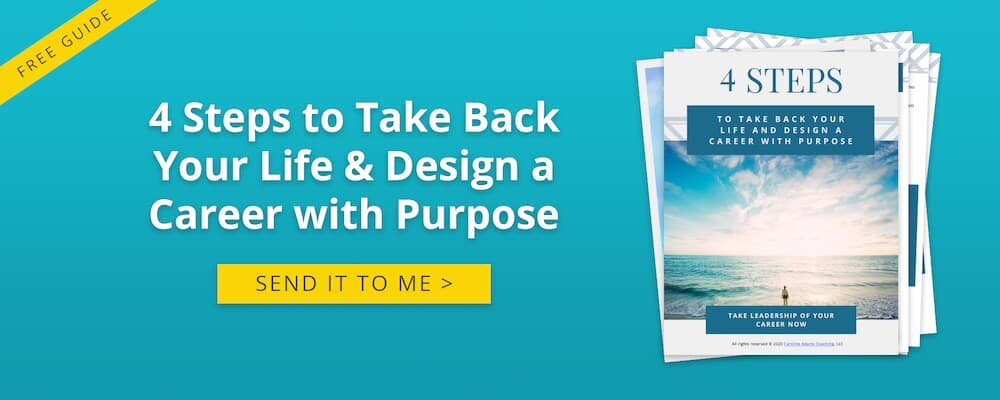Should I Invest In a Career Coach?
Today we’re addressing a common career change question: Should I invest in a career coach?
It might seem like a simple question, but it’s a really powerful one.
Because how you get to the answer can reveal all sorts of hidden money mindset beliefs and other barriers that are ALSO holding you back in your career. 🤯
Plus, “Should I invest in a career coach?” is the wrong question to ask.
Ask the wrong questions, and you’ll get the wrong answers.
So let’s unpack it, ask the right questions, and find the right answers for you.
Should you invest in a career coach? Let’s find out.
Separate the Investment From the Fit
Let’s start by taking the investment out of the equation.
Your first and most important question is: Can this career coach help me get where I want to go?
The price tag has NOTHING to do with whether that career coach is the right fit for you and your goals.
And worrying about the investment before you’ve decided on fit muddies the water.
A “cheap” career coach that charges $500 but doesn’t help you reach your career goals isn’t a good fit. You spent $500 to NOT reach your goals. Good investment?
Alternatively, an “expensive” career coach that charges $50k could be a great fit. Especially if the result of your work together is doubling your six figure salary, increasing your free time, and waking up well-rested in the morning with a sense of purpose.
I’m making up these numbers, but do you see where I’m going with this?
Don’t let your invisible money mindset beliefs distract from whether the career coach is the right fit.
The question of how much to invest is an important-but-completely-different question that comes AFTER you decide if you want to work with this person.
Replace “Cost” with “Investment”
Removing “cost” from your vocabulary and replacing it with “investment” is a game-changer that will serve you well beyond deciding if you should invest in a career coach.
You’re not just spending.
You’re exchanging your time, money, and energy for something of value: whether that’s spending cash on a relaxing massage or spending quality time with your partner.
And when it comes to your career, you’re investing in your future long-term happiness, success, fulfillment, and financial well-being.
Why is the cost/investment distinction so important?
Too many people focus on a one-time “cost of coaching” rather than the dividends and interests you reap for THE REST OF YOUR LIFE.
Just like a bit of intentional quality time with your partner each day positively impacts your relationship over the years, so does intentional quality time focused on what you want for your career and life!
Back to money mindset…For many, the prospect of “losing” money is so painful that they'll act to prevent the loss rather than to realize the potential gains—financial and otherwise.
Ever find yourself doing this?
A former boss of mine calls this playing not to lose instead of playing to win.
When you focus on “cost,” it’s human nature to spend as little time, energy, and money on your career as possible.
Using the term “investment” focuses you on the value and potential return on investment (ROI) of coaching.
But that doesn’t mean that all investments are the right ones for you.
Not All Investments Are Good Investments
Am I’m suggesting that all career coaching is a good investment? Or the bigger the investment the better the coaching?
Heck no.
Value is subjective. You get to decide what’s valuable and whether the investment is worth it for you.
I’ve spent a lot of money on coaches. One of the most expensive coaching programs I invested in was the least valuable for me (and yet valuable in ways I didn’t anticipate).
Ask yourself these questions to determine ROI:
Should I Invest In a Career Coach?
- Is this coach a good fit for me and my goals?
- What are my desired career outcomes?
- What are those outcomes worth to me?
If it’s a good fit, and the value of the outcomes is equal to or greater than the investment, then go for it.
If the career coach can’t articulate the outcomes of coaching, or the outcomes aren’t aligned with what you want, you’re gonna want to find another coach.
(I’ll cover this in a separate post, but you’re going to know when a career coach is right for you because it’s as if they’ve reached into your brain when they talk about your challenges and how to solve them).
I also invite you to factor in the hidden cost of inaction. What’s it costing you to STAY in your current career? How’s THAT investment panning out?
Base Value on Outcomes, Not Time Spent
Repeat after me: You’re not paying a coach for their time. You’re investing in an outcome for yourself.
When I was in college a million years ago, I thought the students who would divide their tuition to calculate the “cost” of each class were really clever.
When you realize that your 8am Econ class “costs” $500, you’re less likely to hit snooze.
But that’s taking a really myopic view.
If I calculated the price tag for all the Econ classes I slept through, I might come up with an alarming tab.
But when I look at the outcomes resulting from my college education and experience—worth every penny.
(I’m not here to say that college is worth it for everyone; just that if you’re calculating it, please consider the value of real outcomes, not hours spent in the lecture hall.)
The same is true when you evaluate coaching.
Sure, you could take the total coaching investment and divide it by the number of coaching sessions. (Please don’t do this).
A solid career coach is focused on helping you achieve real, valuable outcomes. Which I hope are WAY MORE valuable compared to the amount you’re investing.
(Keep in mind: career coaches charging by the hour have a price structure based on how they value their time, not your outcomes. 😬 This is a red flag, IMO, and is a pretty darn transactional approach to what should be a powerful partnership. #BadCoachingJuju)
Coaching Is an Investment of Your Time and Energy
One caveat to what I’m saying above.
Value shouldn’t be calculated by time spent alone.
BUT…the most important investment you can make in yourself is focusing your time and energy on what you want to create in your career.
The most important investment you’ll make—more important than any dollar amount—is committing to do the work.
If you’re unwilling to make your career goals a priority, preferring to give your attention and energy to where you don’t want to be, save your money.
The Better Question: Should I Invest In Myself?
You’re not investing in a career coach. You’re investing in yourself.
This isn’t just semantics. Do you feel the difference between those two statements?
It’s a subtle but powerful shift that will help you start to make decisions about your career and life from a much more empowering, intentional place…a place where you see yourself as a worthy investment.
You’re not paying a coach for their time. You’re investing in an outcome for yourself.
When Should You NOT Invest In a Career Coach?
I believe transforming your career and life is priceless. But not everyone wants transformation. Depending on what YOU want, career coaching might not be the best investment for you.
Here are some reasons NOT to invest in a career coach:
If you don’t like and respect the coach
If their program and outcomes are not aligned with what you truly want
If the investment is more than the value you place on the outcomes
If they charge by the hour (being cheeky here, but this is a potential red flag)
If you don’t see value in investing your time and energy in where you want to go
I hope this helps clarify whether investing in career coaching is right for you.
Remember: the same barriers and limiting beliefs tripping you up in your decision-making about investing in a career coach are likely the same patterns holding you back in your career…
Feeling like you need to go it alone, worrying about money, focusing on what you have to lose, not trusting your intuition, not trusting that you’ll be successful…I could go on.
“Should I invest in a career coach?” is a loaded question. So I invite you to get curious about what that question brings up for you.
If you found this post on whether you should invest in a career coach helpful, you might also enjoy these: What To Expect From a Career Coach, When To Hire a Career Coach, and How a Career Transition Coach Can Help You Make a Leap.
Also, I’ve created a guide that walks through the exact 4-step process I use with my career coaching clients.
Ready to make money doing work you love? Grab your free 4-step career roadmap.
Author Bio:
Before becoming a coach, Caroline worked in management consulting and financial services. She's made it her mission to help people grow, contribute, and get wherever they want to go.
She’s also a tennis fanatic, aspiring Minimalist, FIRE (Financial Independence and Retire Early) enthusiast, and Aloha Spirit seeker 🤙. She loves to share stories from her unconventional life and career focused on freedom, creativity, fun, health, family, and community. If she can do it, you can, too.
The life and career you want is possible once you have the roadmap. Take the first step by downloading your free career roadmap.








